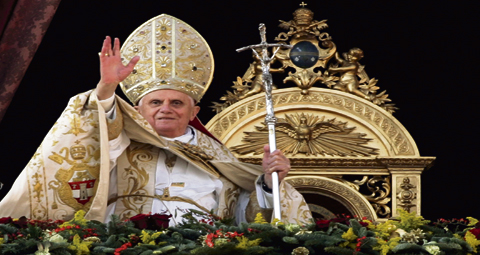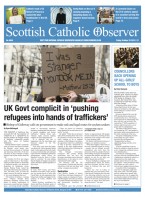January 13 | ![]() 0 COMMENTS
0 COMMENTS ![]() print
print

The state of the world: Where there is life there is hope
This week's SCO editorial.
In what is commonly referred to as his ‘State of the World’ address, Pope Benedict XVI this week sent a hard-hitting message to the world’s governments, via their diplomats, on the spiritual, financial and moral status of our global community which highlighted clear and present dangers but was not without hope.
The Holy Father spoke of the need to protect religious freedom; the shadow cast by the global economy and the value of raising and educating young people in a traditional family environment with a mother and a father. His comments would seem to be in direct reference to the recent problems in North Africa and the Middle East, the global economic and financial crisis and policies—such as same-sex ‘marriage’ being considered here in Scotland—that threaten the traditional family which is the foundation of our society.
“I am deeply concerned for the people of those countries where hostilities and acts of violence continue,” Pope Benedict said, calling for education programmes on religious freedom and referencing in particular Syria, the Holy Land and the ongoing religious persecution and violence in Nigeria.
In regards to the global economy he commented: “The crisis can and must be an incentive to reflect on human existence and on the importance of its ethical dimension, even before we consider the mechanisms governing economic life.”
On the family he said: “The family unit is fundamental for the educational process and for the development both of individuals and States; hence there is a need for policies which promote the family and aid social cohesion and dialogue.”
Throughout his address, the Pope flagged up that today’s present uncertainty is ‘felt particularly by the young.’
“Only when the future is certain as a positive reality does it become possible to live the present as well,” he said.
The Holy Father also spoke of ‘respect for creation,’ natural calamities, nuclear ecological disasters and climate change.
By speaking to the international diplomats at the Vatican, the Pope is directly addressing those in power throughout the world. We do not need to only hope they were listening. We can reinforce this message by letting our elected representatives know our priorities, as individuals and as groups. And, in 2012, ahead of the Year of Faith, we can have faith.
The matter of life and death has again come into sharp focus. The recent 400-page report published by the Commission on Assisted Dying, chaired by Lord Falconer, calls for the legalisation of assisted suicide. The fact that the research had been bankrolled by millionaire author and voluntary euthanasia campaigner Sir Terry Pratchett—and sponsored by Dignity in Dying, the former Voluntary Euthanasia Society—does not bode well for its credibility. However, this did not stop it being welcomed by Independent MSP Margo MacDonald, who hopes to bring assisted suicide legislation back before the Scottish Parliament.
On the other hand British theoretical physicist, cosmologist and author Stephen Hawking has just celebrated his 70th birthday, having lived with Motor Neurone Disease for 50 years, ‘defying time and space.’
As many, no doubt including SCO columnist Fr McGhee and his family who are grieving the recent death of both their parents, would testify: Life is precious and we should not waste a moment of it.










